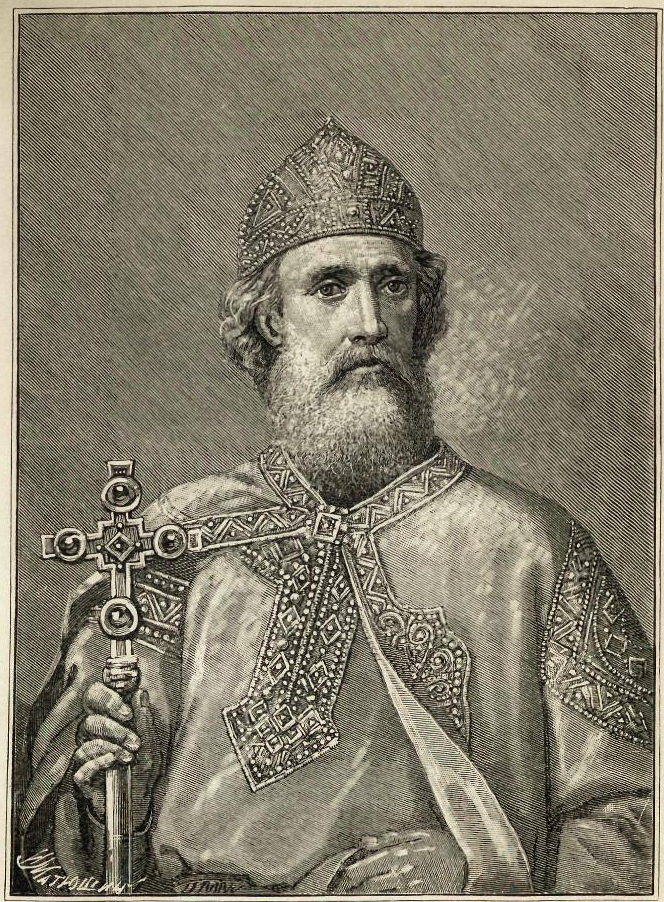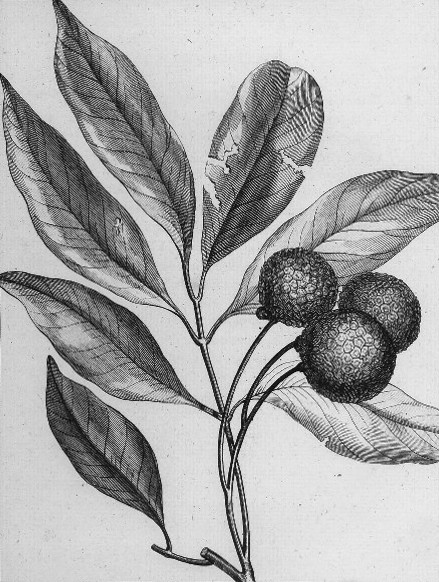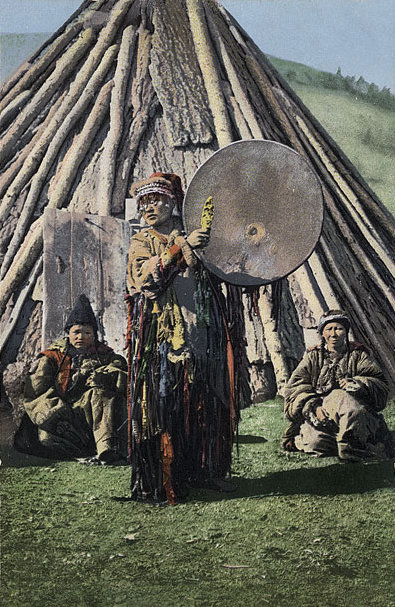|
Liu Chang (Jixing)
Liu Chang (; 942–980), originally Liu Jixing (劉繼興), was the fourth, last and youngest emperor of China's Southern Han dynasty during the warring Five Dynasties and Ten Kingdoms period, reigning from 958 until the Southern Han was annexed by the Northern Song dynasty in 971. Life He succeeded his father Liu Sheng because he was the eldest son. He only left eunuchs in power in his court and mandated castration for anyone who wanted to work for his court because he believed people with children could not be completely loyal. When Liu Chang became Emperor he was only a "mere youth". Reign Liu became Emperor when he was sixteen years old. Historical records report that Liu Chang spent so much time with his harem that he abandoned government affairs. His most favorite concubine was one young Persian girl he called Mèi Zhū (媚豬). The "History of Five dynasties and Ten Kingdoms" described the Persian woman as having copper colored skin and large eyes. It was told that ... [...More Info...] [...Related Items...] OR: [Wikipedia] [Google] [Baidu] |
Chinese Surname
Chinese surnames are used by Han Chinese and Sinicization, Sinicized ethnic groups in Greater China, Korea, Vietnam and among overseas Chinese communities around the world such as Singapore and Malaysia. Written Chinese names begin with surnames, unlike the Western name order, Western tradition in which surnames are written last. Around 2,000 Han Chinese surnames are currently in use, but the great proportion of Han Chinese people use only a relatively small number of these surnames; 19 surnames are used by around half of the Han Chinese people, while 100 surnames are used by around 87% of the population. A report in 2019 gives the List of common Chinese surnames, most common Chinese surnames as Wang (surname), Wang and Li (surname 李), Li, each shared by over 100 million people in China. The remaining eight of the top ten most common Chinese surnames are Zhang (surname), Zhang, Liu, Chen (surname), Chen, Yang (surname), Yang, Huang (surname), Huang, Zhao (surname), Zhao, Wu (surn ... [...More Info...] [...Related Items...] OR: [Wikipedia] [Google] [Baidu] |
Southern Han Emperors
Southern may refer to: Businesses * China Southern Airlines, airline based in Guangzhou, China * Southern Airways, defunct US airline * Southern Air, air cargo transportation company based in Norwalk, Connecticut, US * Southern Airways Express, Memphis-based passenger air transportation company, serving eight cities in the US * Southern Company, US electricity corporation * Southern Music (now Peermusic), US record label * Southern Railway (other), various railways * Southern Records, independent British record label * Southern Studios, recording studio in London, England * Southern Television, defunct UK television company * Southern (Govia Thameslink Railway), brand used for some train services in Southern England Media * 88.3 Southern FM, a non-commercial community radio station based in Melbourne, Australia * Heart Sussex, a radio station in Sussex, England, previously known as "Southern FM" * ''Nanfang Daily'' or ''Southern Daily'', the official Communist Party ne ... [...More Info...] [...Related Items...] OR: [Wikipedia] [Google] [Baidu] |
980 Deaths
Year 980 ( CMLXXX) was a leap year starting on Thursday of the Julian calendar. Events By place Europe * Peace is concluded between Emperor Otto II (the Red) and King Lothair III (or Lothair IV) at Margut, ending the Franco-German war of 978–980. Lothair renounces his claim on Lower Lorraine, while Otto promises to recognize Lothair's son Louis V as the rightful heir of the West Frankish Kingdom. * June 11 – Vladimir I (the Great), grand prince of Kiev, consolidates the Kievan realm from modern Ukraine to the Baltic Sea The Baltic Sea is an arm of the Atlantic Ocean that is enclosed by the countries of Denmark, Estonia, Finland, Germany, Latvia, Lithuania, Poland, Russia, Sweden, and the North European Plain, North and Central European Plain regions. It is the .... Vladimir is proclaimed ruler (''knyaz'') of all Kievan Rus'. * Fall – Otto II sets off on his first expedition to Kingdom of Italy (Holy Roman Empire), Italy. He leaves the government ... [...More Info...] [...Related Items...] OR: [Wikipedia] [Google] [Baidu] |
942 Births
Year 942 ( CMXLII) was a common year starting on Saturday of the Julian calendar. Events By place Europe * Summer – The Hungarians invade Al-Andalus (modern Spain) and besiege the fortress city of Lerida. They devastate Cerdanya and Huesca, and capture Yahya ibn Muhammad ibn al Tawil, Umayyad governor (''wali'') of the town of Barbastro. Lacking food stores and sufficient forage, the Hungarians retreat to the Gothic March. * Battle of Fraxinet: King Hugh of Provence launches an attack on Fraxinet, the Moorish fortress on the Côté d'Azur that had taken control of the Piedmontese valleys. With the assistance of a Byzantine fleet sent by Emperor Romanos I, Hugh lays siege to the Moorish fortress with the help of Hungarian auxiliary troops (Kabars). * Fall – Hugh of Provence makes a truce with the Moors of Fraxinet, after hearing the news that a Swabian army is about to descend on Italy. He allows the Moors to attack the Alpine passes for his own polit ... [...More Info...] [...Related Items...] OR: [Wikipedia] [Google] [Baidu] |
Lin Nu
Lin Nu (林駑, Xiao'erjing: ) was a Chinese merchant and scholar in the early Ming dynasty. He is the ancestor of the late Ming philosopher Li Zhi. His family was Han Chinese in origin and the branch that remained true to Han culture cut off the Lin Nu's branch for marrying a foreigner and converting to another religion. His father was Lin Lü (林閭). Around 1376 the 30-year-old Lin Nu visited Ormuz in Persia, converted to Islam, and married a Semu girl (“娶色目女”) (most likely Persian or Arab) and brought her back to Quanzhou in Fujian. This was recorded in the Lin and Li genealogy (《林李宗谱》). It is believed that the marriage of the Hormuzian Persian girl to Lin Nu which accompanied his conversion to Islam is what caused the other branch of the family to change their surname which is why the same family uses two surnames, Lin and Li, since they were very much against conversion to foreign religions and marriage to other ethnicities in the atmosphere after ... [...More Info...] [...Related Items...] OR: [Wikipedia] [Google] [Baidu] |
Wang Zongyan
Wang Yan () (899–926), né Wang Zongyan (王宗衍), courtesy name Huayuan (化源), also known in historiography as Houzhu of Former Shu (前蜀後主; "last lord of Former Shu"), later posthumously created the Duke of Shunzheng (順正公) by the Later Tang dynasty, was the second and final emperor of China's Former Shu dynasty during the Five Dynasties and Ten Kingdoms period. He was the youngest son of founding emperor Wang Jian (Emperor Gaozu), but became his heir because his mother Consort Xu was Wang Jian's favorite concubine and was able to gain the support of the chancellor Zhang Ge. Wang Yan's reign was traditionally considered one of decadence, corruption, and incompetence. In 925, his state was conquered by its emerging northeastern neighbor Later Tang. Wang Yan surrendered to the Later Tang army, but was later killed by Emperor Zhuangzong of Later Tang. Background Wang Zongyan was born in 899, during the reign of Emperor Zhaozong of Tang, as the youngest of ... [...More Info...] [...Related Items...] OR: [Wikipedia] [Google] [Baidu] |
Li Shunxian
Li Shunxian ( zh, c=李舜弦; , , Sichuan – 926, Sichuan) was a Former Shu poet of Persian origin celebrated for her beauty and poetic talent. She was a concubine of Wang Yan, the second and last emperor of Former Shu. She was famous for being a Persian descent with a remarkable talent for writing poetry in Chinese. Life It is unknown whether she spoke Persian. It is also unknown whether her parents were immigrants to the Tang dynasty or were born there. Her family had adopted the Chinese surname Li. In 880, they fled the Huang Chao rebellion into Sichuan, then the western frontier of imperial China. This migration was also along with many other Chinese including Emperor Xizong. After the collapse of the Tang dynasty in 907, they rose to prominence in the court of the Former Shu Kingdom which ruled over the Sichuan region. She had an older brother Li Xun, who was also a poet and pharmacist at the court and wrote a Chinese book on drugs. They were born in (modern-day Santa ... [...More Info...] [...Related Items...] OR: [Wikipedia] [Google] [Baidu] |
Iranians In China
Iranian people, such as Persians and Sogdians, have lived in China throughout various periods in history. History The Parthian Iranian An Shigao introduced Hinayana Buddhism to China, while the Kushan Lokaksema introduced Mahayana Buddhism. Chorasmians Shams al-Din was an Iranian of Khwarezmian origin from Bukhara, and was appointed by the Mongols to serve as the first provincial governor of Yunnan, in southwestern China. He was allegedly descended from 'Alī bin Abī Tālib and the Prophet, Sayyid Ajall's father was Kamāl al-Dīn and his grandfather was Shams al-Dīn 'Umar al-Bukhārī. He served the court of the Yuan dynasty at Yanjing (modern day Beijing). Later, he was in charge of Imperial finances in 1259, sent to Yunnan by Kublai Khan after conquering the Kingdom of Dali in 1274. After his death, Sayyid was given the posthumous name Zhongyi (忠懿). Later, the imperial court conferred the title "Prince of Xianyang" (咸陽王) and the posthumous name Zhonghui (� ... [...More Info...] [...Related Items...] OR: [Wikipedia] [Google] [Baidu] |
Lu Qiongxian
Lu Qiongxian (盧瓊仙, 10th-century), was a Chinese imperial servant and, behind the scenes, wielded significant political power in steering the empire. She was a servant in the court of Liu Chang (Southern Han) Liu Chang (; 942–980), originally Liu Jixing (劉繼興), was the fourth, last and youngest Emperor of China, emperor of China's Southern Han, Southern Han dynasty during the warring Five Dynasties and Ten Kingdoms period, reigning from 958 u ..., who ruled in 958–972 CE. Some historians believe she was a concubine, some believe she was a general maid or palace servant, and some believe she was actually an official court scholar - one of several female scholars at the court. It is important to note that, in this era, women were more easily accepted in positions of power and learning, compared to in the more conservative centuries that followed. Lu Qiongxian was recognized for her intelligence and eloquence, and was noted as being skilled in poetry. She "wor ... [...More Info...] [...Related Items...] OR: [Wikipedia] [Google] [Baidu] |
Litchi
Lychee ( , ; ''Litchi chinensis''; ) is a monotypic taxon and the sole member in the genus ''Litchi'' in the soapberry family, Sapindaceae. There are three distinct subspecies of lychee. The most common is the Indochinese lychee found in South China, Malaysia, and northern Vietnam. The other two are the Philippine lychee (locally called ''alupag'' or ''matamata'') found only in the Philippines and the Javanese lychee cultivated in Indonesia and Malaysia. The tree has been introduced throughout Southeast Asia and South Asia. Cultivation in China is documented from the 11th century. China is the main producer of lychees, followed by India, Vietnam, other countries in Southeast Asia, other countries in South Asia, Madagascar, and South Africa. A tall evergreen tree, it bears small fleshy sweet fruits. The outside of the fruit is a pink-red, rough-textured soft shell. Lychee seeds contain methylene cyclopropyl glycine which has caused hypoglycemia associated with outbreaks of e ... [...More Info...] [...Related Items...] OR: [Wikipedia] [Google] [Baidu] |
Shamanism
Shamanism is a spiritual practice that involves a practitioner (shaman) interacting with the spirit world through altered states of consciousness, such as trance. The goal of this is usually to direct spirits or spiritual energies into the physical world for the purpose of healing, divination, or to aid human beings in some other way. Beliefs and practices categorized as shamanic have attracted the interest of scholars from a variety of disciplines, including anthropologists, archeologists, historians, religious studies scholars, philosophers, and psychologists. Hundreds of books and academic papers on the subject have been produced, with a peer-reviewed academic journal being devoted to the study of shamanism. Terminology Etymology The Modern English word ''shamanism'' derives from the Russian word , , which itself comes from the word from a Tungusic language – possibly from the southwestern dialect of the Evenki spoken by the Sym Evenki peoples, or from the ... [...More Info...] [...Related Items...] OR: [Wikipedia] [Google] [Baidu] |





